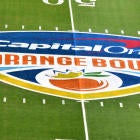As reigning national champion Clemson rushes toward a fifth consecutive conference title and another presumed College Football Playoff berth, one of the more unique challenges of this season has emerged. That is how to best describe the quality of the league the Tigers play in, the ACC.
Mediocre? Middling? Average? Ordinary?
Actually, that's being charitable. With three weeks still left in the season, 13 of the ACC's 14 teams all have lost at least three games. Last season, 12 of the 14 all lost at least four.
That's similar to the Pac-12 in both 2017 and 2018. In those two seasons combined, only one team had less than three losses. Washington State went 11-2 in 2018.
The ACC is so, let's say, top heavy, that No. 3 Clemson is its only team in the College Football Playoff Rankings entering Tuesday night's third edition. That's where it gets especially, um, mediocre.
By contract, some ACC team has to play in the Orange Bowl. Also by contract, that berth would go to the next highest-ranked ACC team after Clemson, assuming the Tigers once again make it to the playoff.
With Clemson as the ACC's only currently ranked team, that decision would kick back to the Orange Bowl board of directors. It is believed that would be the first time in the CFP's six-year history that a New Year's Six bowl could be picking an unranked team.
Never mind the rarity of the situation, what would the Orange Bowl and ACC do about some school's (or schools') feelings perhaps getting hurt?
"It's a great question," said Eric Poms, Orange Bowl CEO. "We are hopeful, obviously, with [three] weekends of football still to go there is a path for some team from the ACC to get back in there."
Perhaps. RealTimeRPI.com has the ACC ranked sixth among the 10 FBS conferences, behind the AAC (No. 4) and Pac-12 (No. 5). Six of the 14 ACC teams are currently at .500 or worse.
There are currently only nine bowl-eligible teams for the ACC's 10 bowls (including Notre Dame).
Before there was a playoff or BCS or Bowl Alliance or Bowl Coalition, there was the old less-than-transparent backroom bowl deals. That was pre-1992. That's not exactly the case in this situation. Without an obvious next-best ranked ACC team to choose from, the bowl would consult with its partners -- the ACC, Notre Dame, Big Ten and SEC.
In seasons such as this when the Orange Bowl isn't part of the playoff, the ACC gets one spot opposite either Notre Dame or a team from the Big Ten or SEC. This season that spot goes to the highest-ranked available team among the three.
The Orange Bowl is one of three "contract" bowls in the New Year's Six rotation. Meaning those three bowls are contracted to conference partners. When it is not part of the playoff, the Rose Bowl matches the Pac-12 and Big Ten. Similarly, the Sugar Bowl matches the Big 12 and SEC.
If those conference champions aren't available, the bowls make the pick of the next-best available team those leagues.
The ACC is a bit different. The league's opponent in the Orange Bowl would be picked after the Sugar Bowl and Rose Bowl fill their spots.
There would be rematch issues if Notre Dame was involved in the Orange Bowl. The Irish have played Virginia and Virginia Tech as part of their ACC scheduling agreement. The Cavaliers and Hokies -- both 7-3 -- are headed toward a Nov. 29 showdown.
"I don't know what would drive our thought process," Poms said. "We haven't convened a group to do that."
All of it could just be … uncomfortable. There is no easy way to decide these things when subjectivity is involved. In 1973, Michigan and Ohio State tied their annual game 10-10, thus tying for the Big Ten title. By vote of Big Ten athletic directors, Ohio State was allowed to go to the Rose Bowl.
There was hope Sunday for a regular Orange Bowl. Virginia Tech entered the AP Top 25 at No. 25. A second ACC team hadn't appeared in the AP Top 25 since Nov. 3. The Hokies (7-3) are one of three teams with same record in the ACC Coastal. The others are Virginia and Pittsburgh.
Whatever team wins the Coastal is already seen as speed bump for Clemson. The Tigers -- winners of 22 in a row overall -- have beaten four straight Coastal winners in the ACC Championship Game by an average of more than 20 points.
Going into Saturday, Wake Forest had the second-best record overall record in the conference, 7-2. The Tigers won by 49.
Clemson's excellence is largely to "blame" for the Orange Bowl conundrum. The Tigers have become so dominant in terms of talent and resources that they have almost separated themselves from the league they play in.
It's almost as if Clemson has an ACC scheduling agreement. If anything, it more resembles an SEC program. The Tigers are 38-2 over the last five seasons in the ACC with an average victory margin of 25 points.
Given that dominance, the Orange Bowl might best be accessed by a team that doesn't play in the ACC title game, thus avoiding possible Clemson embarrassment. Prior to Saturday, Miami (6-4) had a better chance at the Orange if it didn't win the Coastal. The Hurricanes were eliminated from the division race on Saturday.
On the plus side, other than Clemson, four ACC teams (Pittsburgh, Wake Forest, Virginia and Virginia Tech) still have a chance to get to nine wins. Nine wins would almost certainly get a second ACC team ranked, wouldn't it?
Wouldn't it? Not so fast. Schedule strength is everything to the CFP Selection Committee and this is the ACC. In a weird twist, if Clemson somehow doesn't finish undefeated, perhaps it doesn't deserve to be in the playoff. That would be one of the vagaries of the ACC, too.
CFP executive director Bill Hancock said there was no thought given to the committee doing the conference a solid. That would extending its top 25 ranking to 30 to possibly accommodate the ACC.
That would be extending the mediocrity.





















